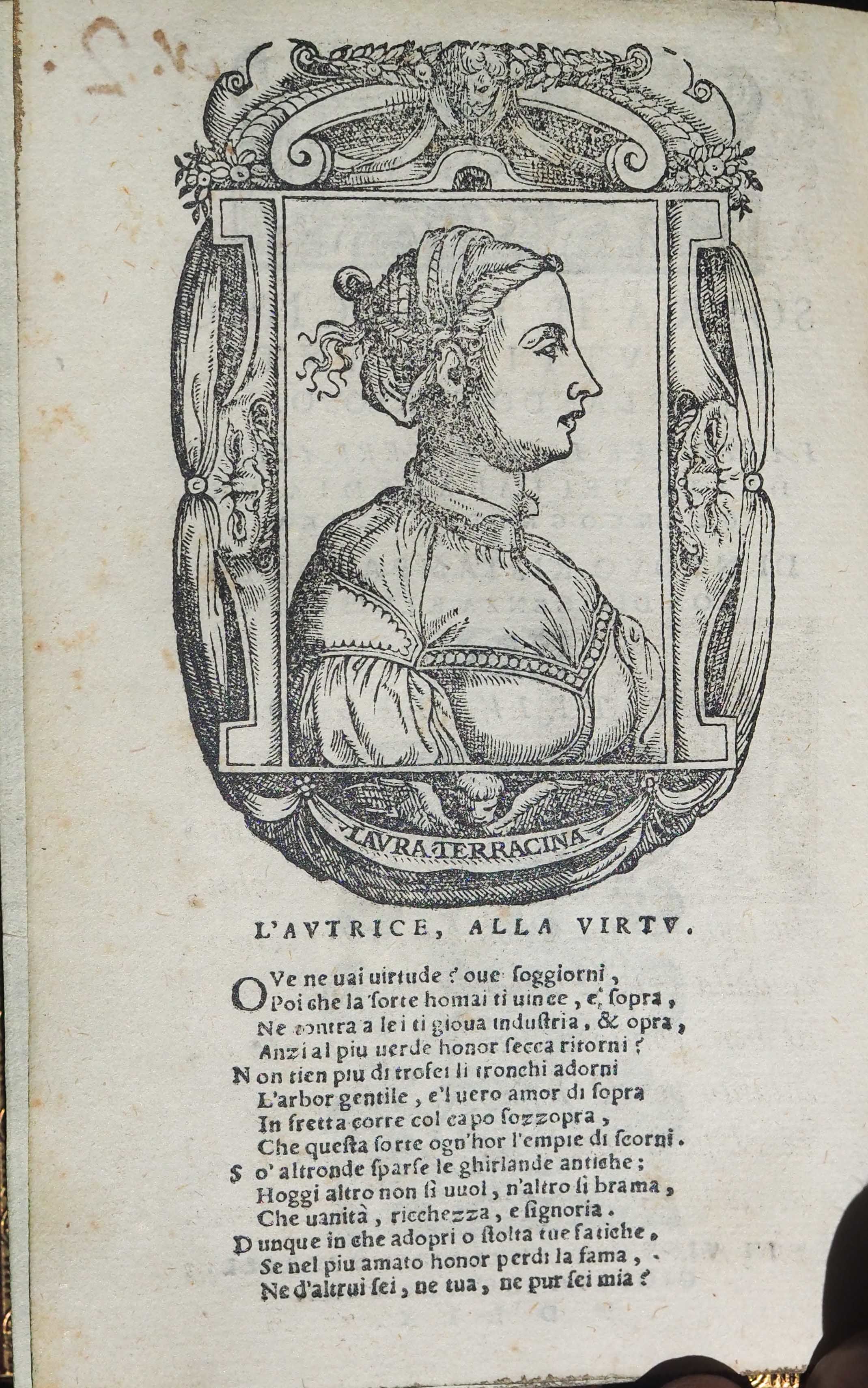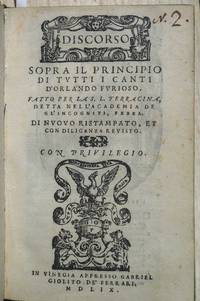Discorso sopra il principio di tutti i canti d'Orlando Furioso ...
- SIGNED
- Venice: Gabriel Giolito de' Ferrari, 1559
Venice: Gabriel Giolito de' Ferrari, 1559. Fifth Giolito edition. Octavo (15 cm); 88 leaves. Printer's device and cartouche on title page. Author's portrait within elaborate cornice on verso of title page; two historiated initials, and 46 woodcut vignettes taken from the 1542 Giolito edition of Ariosto's poem. Handsomely bound in 19th-century (?) crushed morocco with gold double fillets and delicate cornerpieces. Spine in six compartments decorated in gilt with title and date stamped in gilt. Gilt dentelles; marbled endleaves. Trimmed close at top edge. A few stains to early leaves, else negligible spotting. Bongi, II, 77-78; BM Italian 665.
We know merely from the multiple printings--not only of the Discorso offered here, but of Laura Terracina's several books of poems--that she was one of the most popular poets of her lifetime, and certainly (as Nancy Dersofi has written) "the most prolific woman poet of her century." The Dicorso offered here is a highly original take on the "cento" (a poem composed by selecting and rearranging lines from some other well-known poem). In this case, Terracina presents 46 cantos (corresponding to the 46 cantos of Ariosto's Orlando Furioso) of eight stanzas each, and each stanza ends with a line--in sequence--from the from the opening stanza of the corresponding canto in Ariosto's poem. While there is glancing reference in the Discorso to the characters and action of Orlando Furioso, each of Terracina's cantos is a classical satire castigating betrayers of friendship, fraudsters, flatterers, usurers, lechers, and so on. Each canto is dedicated either to an individual (many of them women) or to categories of people, such as "enemies of women" or (loosely translated) "insatiable sex addicts." The text of the Discorso is followed by a collection of sonnets addressed to various friends, enemies, and correspondents (Vittoria Colonna, Giovanna d'Aragona, Giulia Gonzaga among them). The volume closes with three "love letters" by the eccentric poligrafo Anton Francesco Doni. A strong statement of Renaissance feminism, Terracina's Discorso is "a forceful call to intellectual arms," writes Meredith K. Ray, in which author asserts that "women must give voice to their own experience, and to each other's" so that "male writers would not have silenced their accomplishments.
We know merely from the multiple printings--not only of the Discorso offered here, but of Laura Terracina's several books of poems--that she was one of the most popular poets of her lifetime, and certainly (as Nancy Dersofi has written) "the most prolific woman poet of her century." The Dicorso offered here is a highly original take on the "cento" (a poem composed by selecting and rearranging lines from some other well-known poem). In this case, Terracina presents 46 cantos (corresponding to the 46 cantos of Ariosto's Orlando Furioso) of eight stanzas each, and each stanza ends with a line--in sequence--from the from the opening stanza of the corresponding canto in Ariosto's poem. While there is glancing reference in the Discorso to the characters and action of Orlando Furioso, each of Terracina's cantos is a classical satire castigating betrayers of friendship, fraudsters, flatterers, usurers, lechers, and so on. Each canto is dedicated either to an individual (many of them women) or to categories of people, such as "enemies of women" or (loosely translated) "insatiable sex addicts." The text of the Discorso is followed by a collection of sonnets addressed to various friends, enemies, and correspondents (Vittoria Colonna, Giovanna d'Aragona, Giulia Gonzaga among them). The volume closes with three "love letters" by the eccentric poligrafo Anton Francesco Doni. A strong statement of Renaissance feminism, Terracina's Discorso is "a forceful call to intellectual arms," writes Meredith K. Ray, in which author asserts that "women must give voice to their own experience, and to each other's" so that "male writers would not have silenced their accomplishments.






